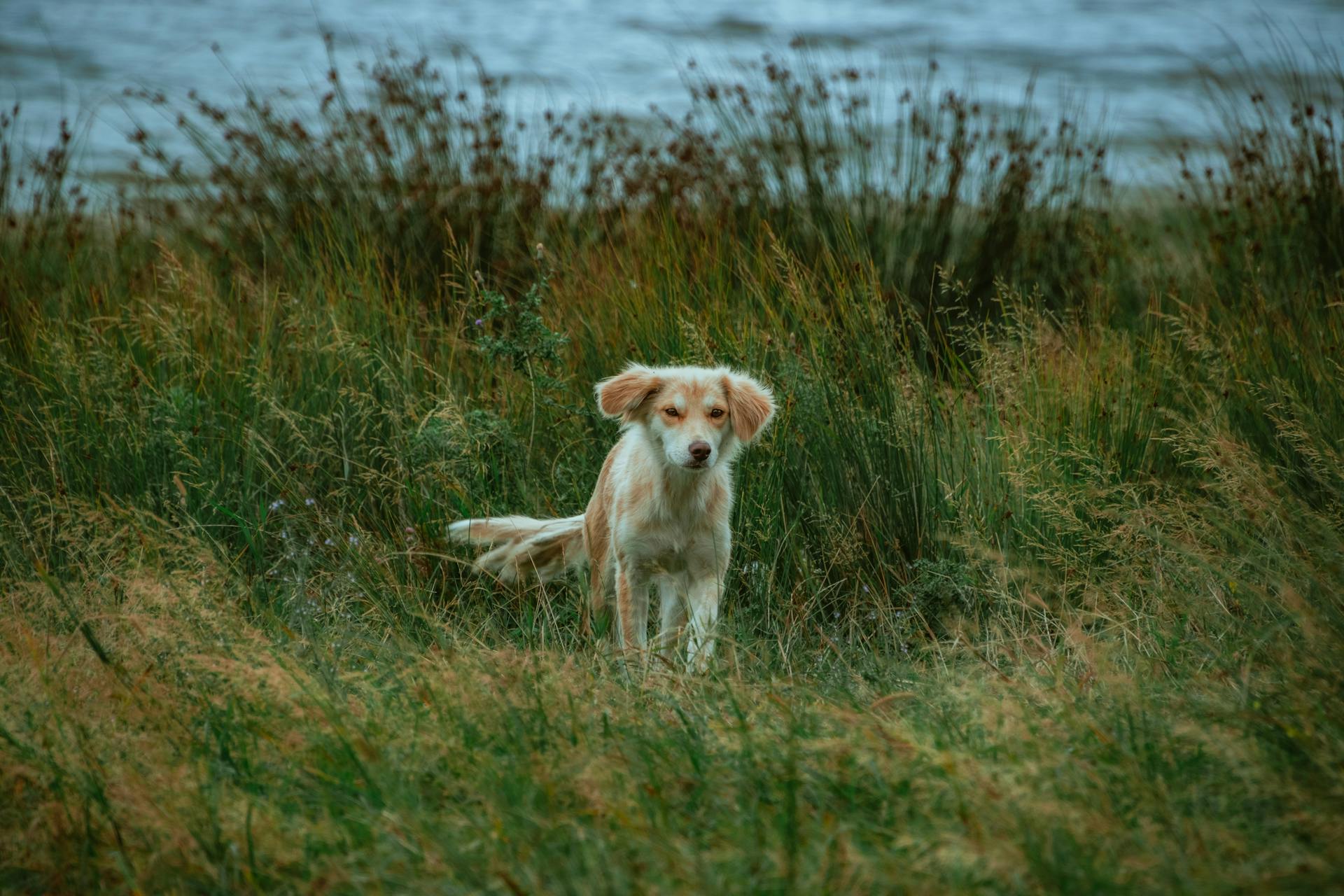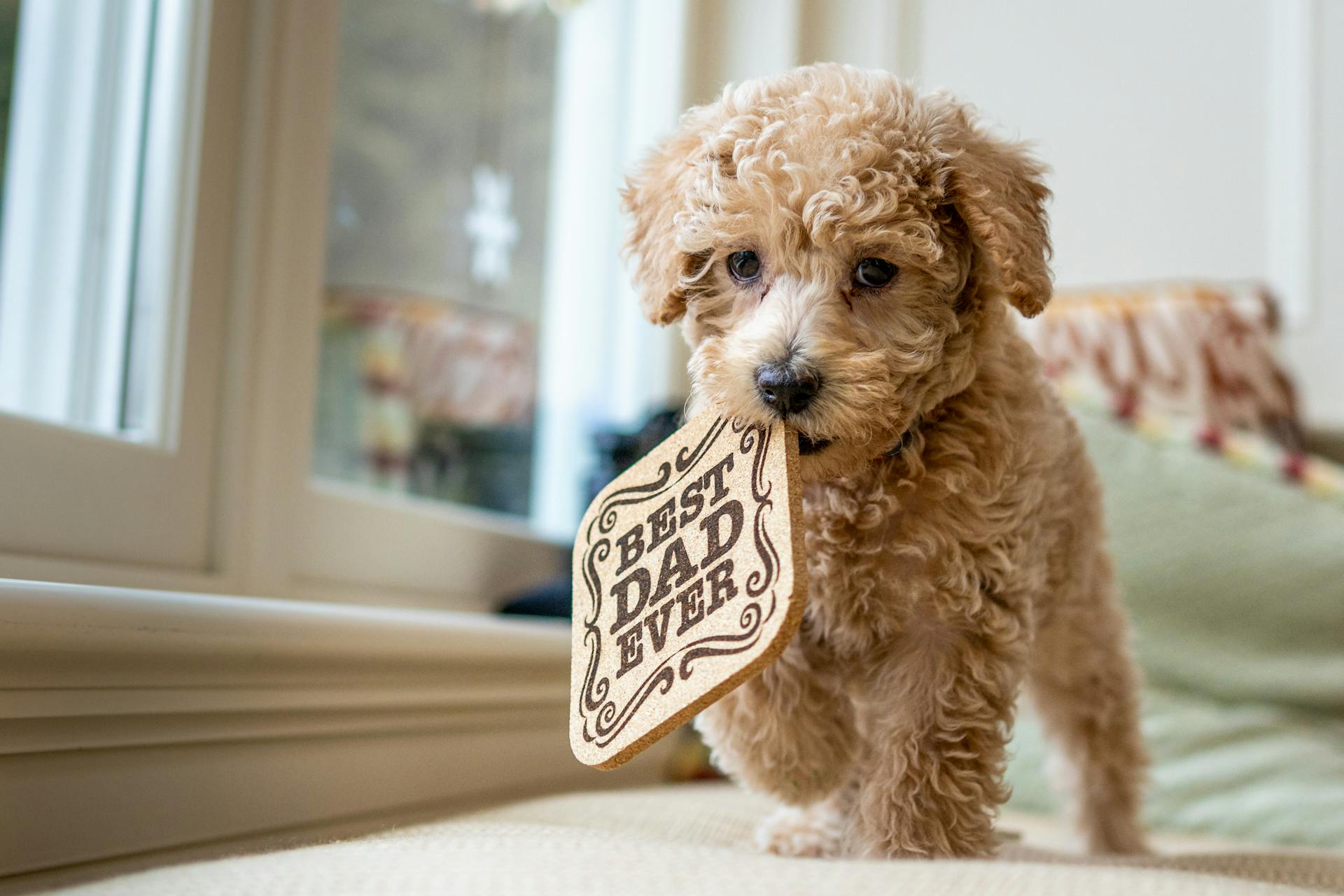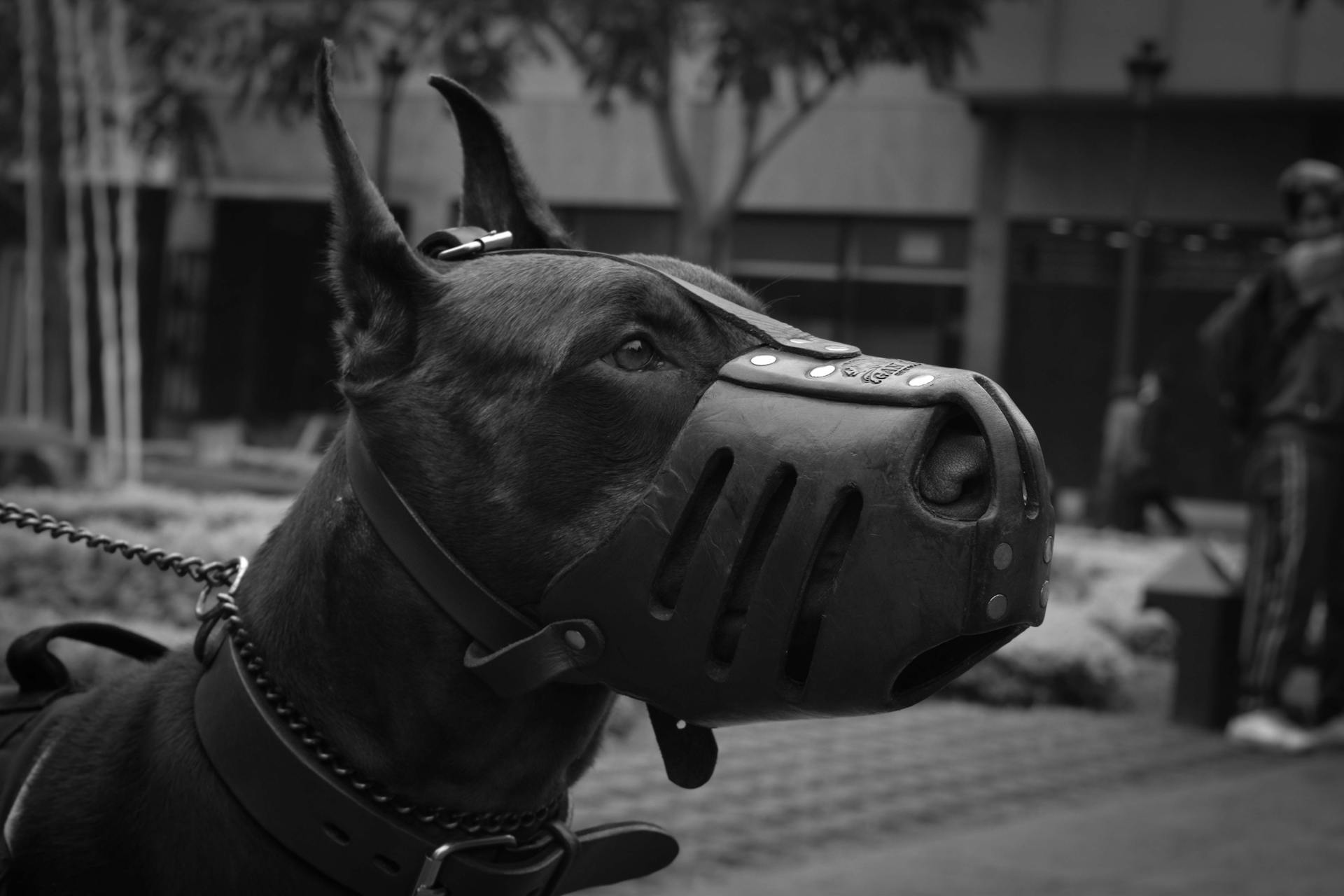
Finding a responsible Doberman Pinscher breeder can be a daunting task, but it's crucial for ensuring the health and well-being of the puppy. Research is key, and it's essential to look for breeders who are transparent about their breeding practices and health clearances.
Do your homework and ask plenty of questions - a good breeder will be happy to share information about their breeding program, including the health clearances of their dogs. In fact, reputable breeders will have their breeding stock tested for inherited diseases such as dilated cardiomyopathy and von Willebrand's disease.
A responsible breeder will also be willing to let you visit their facility and meet the parents of the puppy you're interested in. This will give you a chance to see the conditions in which the dogs are kept and get a sense of the breeder's temperament and expertise.
Look for breeders who are registered with a national kennel club, such as the American Kennel Club (AKC), and who adhere to their code of ethics. This will give you some assurance that the breeder is committed to breeding healthy, well-socialized puppies.
If this caught your attention, see: Puppy Doberman Pinscher
What to Expect from a Responsible Breeder
A responsible breeder will know the breed standard and use it as a blueprint for producing quality dogs.
They will provide an abundance of information as part of the sale, such as care and feeding instructions, breed information, health and vaccination records, copies of health testing completed, as well as aftercare and expertise in dealing with cropped ears.
A responsible breeder will stay involved after the sale and be available for questions and assistance, including a return policy in case the puppy doesn't work out.
They will be able to accurately discuss the needs of the Doberman Pinscher to determine if this breed is right for you, and will ask many questions of prospective homes as part of an appropriate placement.
A responsible breeder will provide a pedigree and AKC registration paperwork, and may require a spay/neuter agreement on any dogs not considered breeding animals.
Core Meaning of a Responsible Breeder
A responsible breeder is someone who puts the needs of the dogs first, not just their own profit. They have a deep understanding of the breed standard and use it as a guide to produce high-quality dogs.
They're not just breeding for the sake of making money, but also acknowledging the responsibility that comes with producing puppies. This means they care about each puppy's well-being and placement, and provide plenty of information to new owners.
A responsible breeder will give you a detailed guide on how to care for your new dog, including feeding instructions, breed information, and health records. They'll also provide aftercare and be available for questions and assistance.
They'll be able to tell you all about the needs of the Doberman Pinscher, so you can decide if this breed is right for you. This includes recognizing individual traits in puppies that will match them with the right home.
Participating in dog clubs is a sign of a responsible breeder's commitment to the breed. They'll have a code of ethics to follow and a reputation to uphold in the dog community. This means they'll be able to provide references and have a contract or bill of sale.
Here are some key things to look for in a responsible breeder:
- They'll have a return policy in case things don't work out.
- They'll require a home check and references before placing dogs.
- They'll ask plenty of questions to ensure the right puppy is going to the right home.
- They'll provide a pedigree and AKC registration paperwork.
- They may require a spay/neuter agreement for non-breeding animals.
Personality
Doberman Pinschers are known for their superintelligence and boundless energy, making them a dynamic companion.
Their loyalty and playfulness within their family circle are truly special, and they'll always have their loved ones' backs if they sense any threat.
However, they don't display aggression without cause, so you can rest assured they won't become overly defensive.
To keep them busy and engaged, it's essential to provide both physical and mental stimulation, as they learn quickly and training comes easily to them.
Training sessions should be kept fresh and engaging, or they might get bored and disinterested.
Dobermans generally don't show excessive stubbornness or willfulness, especially under consistent and kind leadership.
One unique aspect of their personality is their extended period of puppy-like behavior, lasting until they're three to four years old.
This extended puppyhood is influenced by genetics, training, and socialization, so it's crucial to get it right from the start.
Early socialization is vital, involving exposure to diverse people, environments, and experiences during their formative months.
Enrolling them in puppy kindergarten classes and introducing them to visitors, busy parks, dog-friendly stores, and friendly neighbors will refine their social skills.
A fresh viewpoint: Doberman Dog Training
Breed Characteristics
The Doberman Pinscher is a breed that's steeped in history and popularity, originating from Germany.
They come in a range of sizes, typically weighing between 60 to 100 pounds (27 to 45 kilograms).
Doberman Pinschers are part of the Working Group, a category that speaks to their intelligence and loyalty.
Their short, smooth coat requires minimal grooming, with regular brushing being the only maintenance needed.
With a lifespan of 10 to 13 years, Doberman Pinschers are a long-term commitment for any owner.
Here are some key characteristics of the breed:
Doberman Pinschers are highly trainable and eager to please, making them a joy to work with.
Characteristics
The Doberman Pinscher is a breed of dog that's known for its impressive characteristics. Originating from Germany, this breed has a rich history.
Doberman Pinschers come in a range of sizes, typically weighing between 60 to 100 pounds (27 to 45 kilograms). They're a medium to large breed, making them a great companion for active families.
Related reading: Doberman Pinscher Breed Standard
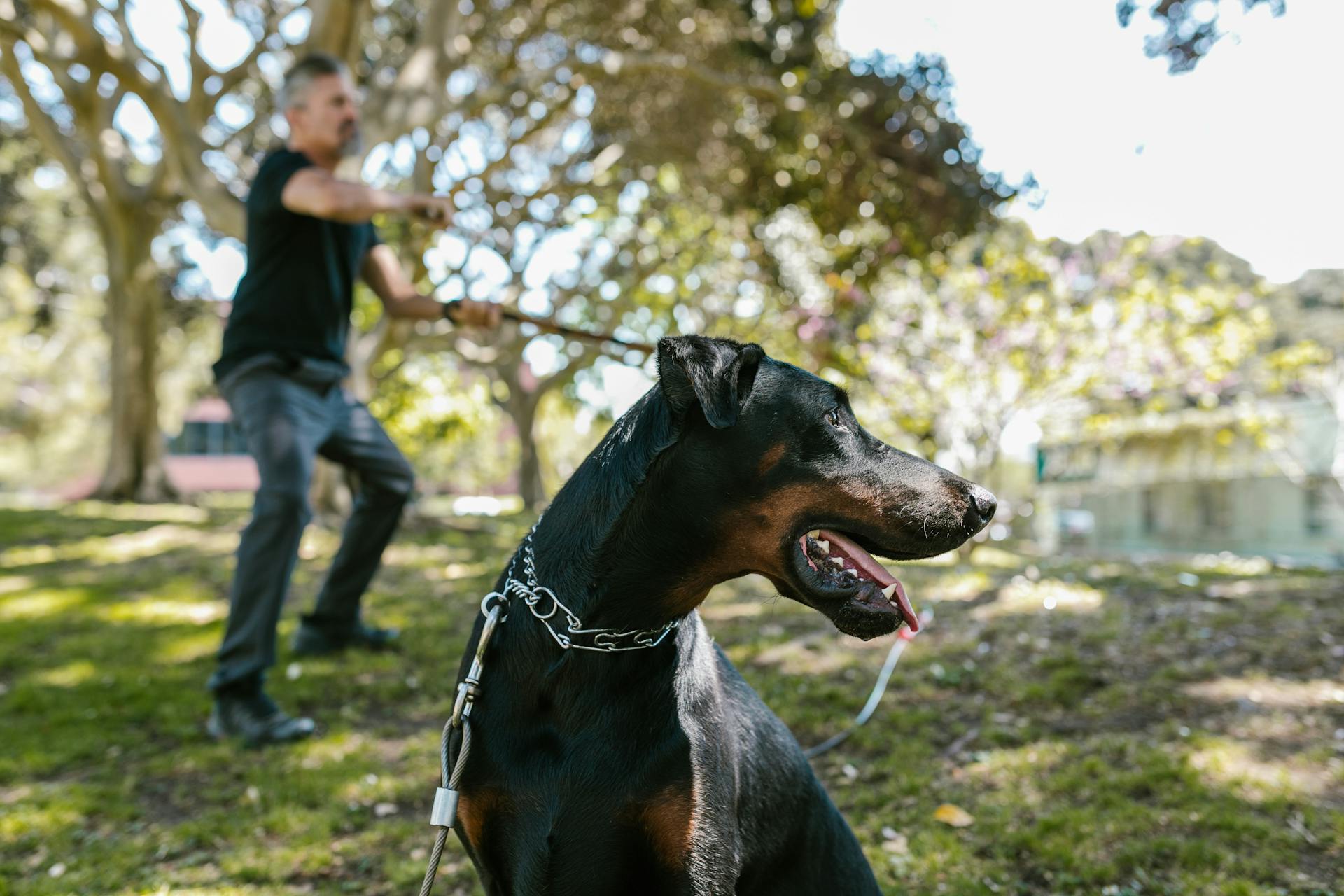
Their coat is one of their most distinctive features - it's short and smooth, and can come in a variety of colors including black, red, blue, or fawn with rust markings.
Here are some key characteristics of the Doberman Pinscher breed:
- Origin: Germany
- Size: 60 to 100 pounds (27 to 45 kilograms)
- Coat: Short, smooth coat that can come in black, red, blue, or fawn with rust markings
- Lifespan: 10 to 13 years
Their temperament is also worth noting - Doberman Pinschers are intelligent, loyal, and alert, making them great family pets. They're known for their protective nature and strong bond with their families.
Size
Male Dobermans generally have a height ranging from 26 to 28 inches, measured at the shoulder.
Females stand slightly shorter, with heights varying between 24 to 26 inches.
Males tend to be slightly larger and heavier than females, weighing between 60 to 80 pounds.
These size differences contribute to the characteristic appearance of each gender, with males typically exhibiting a more robust and imposing presence, while females possess a more refined and elegant demeanor.
Regardless of gender, Dobermans are renowned for their intelligence, loyalty, and protective instincts, making them cherished members of families and valuable assets in various roles.
Kettle Cove
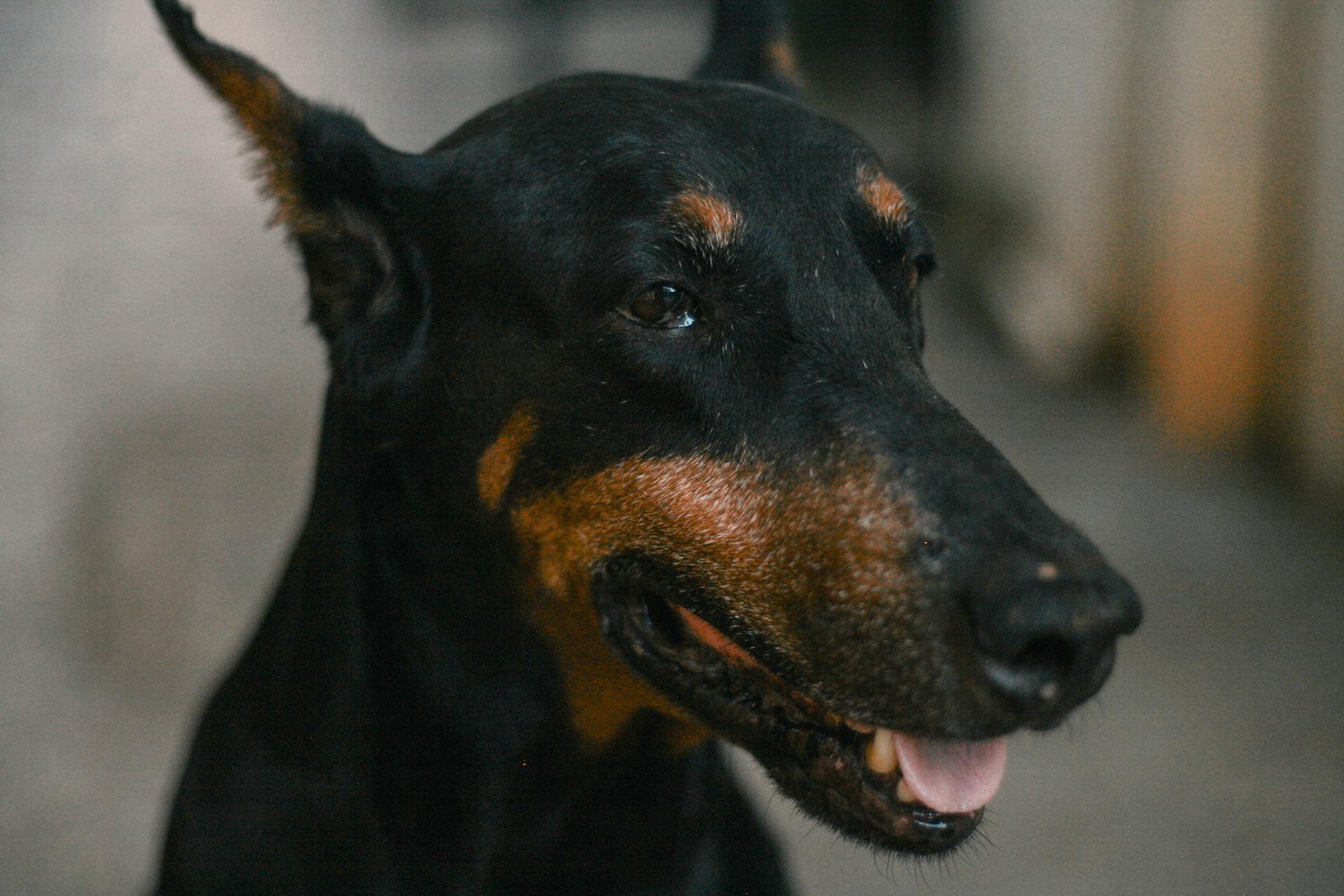
Kettle Cove Dobermans is a reputable breeder with three decades of experience. They focus on producing high-quality, show Dobermans that embody health, intelligence, and beauty.
Their breeder, Sharon Duval, is an American Kennel Club breeder of merit, and she has a ´Bred with H.E.A.R.T.´ AKC badge. This indicates her commitment to the health and well-being of purebred dogs.
Kettle Cove Dobermans breeds show prospects and companion dogs. If you're a first-time owner looking for a show prospect, you'll need to sign a co-ownership contract.
Their companion and pet dogs are sold with a limited registration, on a spay and neuter contract. This ensures the well-being of the dogs and their owners.
See what others are reading: Doberman Pinscher Diseases
Love A Dobie
Love A Dobie is a reputable breeder with over 15 years of experience in the field, led by Cadian Robinson and her husband Ty.
Their ultimate goal is to breed the best dogs in Georgia state and the surrounding areas.
They raise their puppies in their home with their children, giving them plenty of love and attention.
The bloodlines they use are Kimbertal and Von Schwarz, which are often recognized as top bloodlines in the country.
These bloodlines are used to breed healthy and happy Doberman dogs, with the goal of changing the public's perception of Dobermans as family pets.
Health and Care
Doberman Pinschers are generally a healthy breed, but like all dogs, they can be prone to certain health issues. Von Willebrand's Disease is an inherited blood disorder that impairs clotting, leading to excessive bleeding after injury or surgery.
Some common health concerns in Dobermans include Hip Dysplasia, a hereditary condition where the thighbone doesn't fit properly into the hip joint, and Progressive Retinal Atrophy (PRA), a group of eye diseases causing gradual retina deterioration.
Dogs with certain health conditions, such as Hip Dysplasia and Von Willebrand's Disease, should not be bred to prevent the passing on of these issues to future generations. Regular veterinary check-ups can help identify potential health problems early on.
Readers also liked: Doberman Pinscher Hip Dysplasia
Here are some common health issues in Dobermans:
- Von Willebrand's Disease: excessive bleeding after injury or surgery
- Hip Dysplasia: thighbone doesn't fit properly into the hip joint
- Progressive Retinal Atrophy (PRA): gradual retina deterioration
- Spinal Bifida: birth defect where the vertebrae don't fully close over the spinal cord
- Gastric Dilatation-Volvulus (Bloat): life-threatening condition caused by stomach distention and twisting
Health
As a Doberman Pinscher owner, it's essential to be aware of the potential health issues that can affect your furry friend. Von Willebrand's Disease is an inherited blood disorder that impairs clotting, leading to excessive bleeding after injury or surgery.
Regular veterinary check-ups are crucial to monitor your Doberman's health. Hip Dysplasia is a hereditary condition where the thighbone doesn't fit properly into the hip joint, causing pain and lameness in the rear legs.
Some Dobermans may experience Progressive Retinal Atrophy (PRA), a group of eye diseases causing gradual retina deterioration. This can lead to night-blindness and daytime vision loss.
If you notice any of the following symptoms, consult a veterinarian immediately: nosebleeds, bleeding gums, or bleeding in the stomach or intestines. These can be signs of Von Willebrand's Disease.
Here are some common health issues that can affect Dobermans:
It's essential to work with a reputable breeder who health tests their breeding stock and prioritizes the well-being of their dogs.
Coat Color and Care
Doberman Pinschers have a sleek and smooth coat that lies close to the skin and comes in four main colors: black, red, blue, and fawn, often with rust markings.
Their coat is relatively low-maintenance, requiring minimal grooming, but weekly brushing with a grooming mitt or rubber curry is usually sufficient to prevent shedding.
Baths are needed only when they get into something smelly or muddy, but regular nail trims are necessary to avoid painful tears and other issues.
Weekly ear checks are vital to watch for signs of infection such as redness or bad odor, and cleaning the outer ear with a cotton ball and gentle ear cleaner can help prevent infections.
Regular dental care is essential for Doberman Pinschers, and brushing their teeth two to three times a week helps prevent tartar buildup and gum disease.
Inspecting your Doberman during grooming sessions can aid in identifying potential health problems early, such as sores, rashes, or signs of infection on the skin, in the nose, mouth, and eyes.
Clear eyes with no redness or discharge are signs of good health, and a thorough weekly examination can help promote the well-being of your beloved Doberman.
Worth a look: Doberman Pinscher Coat Colors
Exercise and Living
Exercise is crucial for Doberman Pinschers. Regular physical activity helps maintain their lean physique and agile body.
Doberman Pinschers are naturally energetic dogs and require at least 30 minutes of exercise daily. This can be achieved through a combination of walks, runs, and playtime.
A well-exercised Doberman Pinscher is less likely to develop obesity-related health issues. This is especially important for Dobermans, as they can be prone to obesity.
Doberman Pinschers thrive on mental and physical stimulation, making activities like agility training and obedience exercises ideal for their needs.
Related reading: Doberman Pinscher Exercise Needs
Breed Organizations and History
The Doberman Pinscher breed has a rich history that spans over a century. Louis Dobermann of Thuringen, Germany, a door-to-door tax collector, played a significant role in creating this breed by crossing various dogs to create an alert and streamlined guard dog.
The first breed club was formed in 1899, just a few years after Dobermann started working on the breed. This marked the beginning of the Doberman Pinscher's rise to fame.
The breed's popularity continued to grow, and by 1908, the first Doberman arrived in America. They soon became a favorite among police and military forces due to their intelligence, loyalty, and athleticism.
Breed Organizations
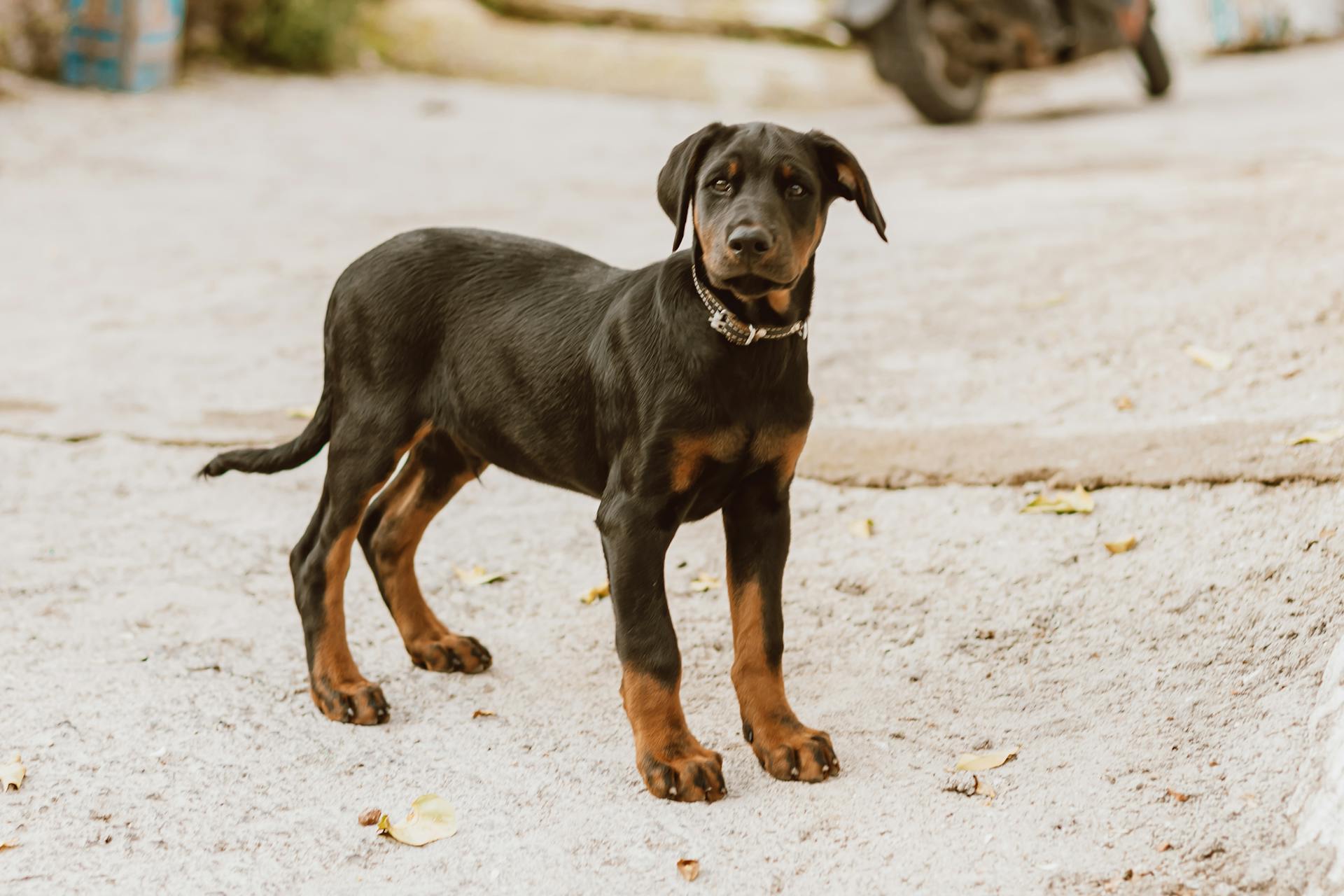
The Doberman Pinscher breed has a rich history and is supported by various organizations that provide valuable resources and information to enthusiasts and breeders alike.
One key organization is the Doberman Pinscher Club of America (DPCA), which is a vital source of knowledge and guidance for Doberman owners and enthusiasts.
The DPCA is dedicated to promoting the breed and providing a community for Doberman lovers to connect and share their experiences.
Here are some of the key breed clubs and organizations for the Doberman Pinscher:
- Doberman Pinscher Club of America (DPCA)
History
The Doberman breed has a fascinating history that spans over a century. Few people can claim to have had as great an impact on the dog world as Louis Dobermann of Thuringen, Germany.
Louis Dobermann was a door-to-door tax collector who needed a dog to accompany him on his rounds. He set about to create an alert, streamlined guard dog by crossing various breeds.
By the late 1800s, Dobermann had obtained the prototype of the breed that now bears his name. The original Dobermans were still somewhat heavy-boned and round-headed.
The breed evolved rapidly, and by 1899, the first breed club was formed. This marked the beginning of the Doberman's rise to fame.
The first Doberman arrived in America in 1908, and they soon found favor throughout Europe and America as a police dog and war dog. Their chiseled silhouette and fearless alert demeanor made them a top contender as a show dog.
The Doberman eventually rose to be the second most popular breed in America in 1977. Unfortunately, the media cast the Dobe in the role of a vicious breed, which unfairly suffered their reputation.
In an effort to decrease the chance of producing albino Dobermans, the Doberman Pinscher Club of America convinced the AKC to tag the registration numbers of dogs with the likelihood of carrying the albino gene with the letter Z.
On a similar theme: Albino Doberman Pinscher
3. Regal Empire
Regal Empire Dobermans is a kennel run by war veterans. They're committed to breeding Dobermans with fantastic temperaments and no health problems.
Their mission is to place these noble animals in the homes of caring families. They believe that Dobermans possess a unique ability to bond with all members of the family.
Regal Empire Dobermans offers cropping of puppies' ears, tail docking, and dew claw removal.
Finding a Breeder
A responsible breeder will know the breed standard and use it as a blueprint for producing quality dogs. They're not breeding for profit and acknowledge responsibility for every dog they produce.
They care about each puppy and its placement, providing an abundance of information as part of the sale, such as care and feeding instructions, breed information, health and vaccination records, and copies of health testing completed. This shows they're committed to the well-being of their dogs.
If you're looking for a reputable breeder, look for their involvement in dog clubs and activities. The Doberman Pinscher Club of America (DPCA) is a great place to start.
A fresh viewpoint: Doberman Pinscher Care
Puppies for Sale
If you're looking for puppies, you can start by researching reputable breeders in your area.
A good place to begin is by checking online directories or asking for referrals from friends or family members who have experience with the breed.
With no further ado, let us dive into the best breeders in your region.
Discover more: Miniature Pinscher Breeders
Von Hohenhalla
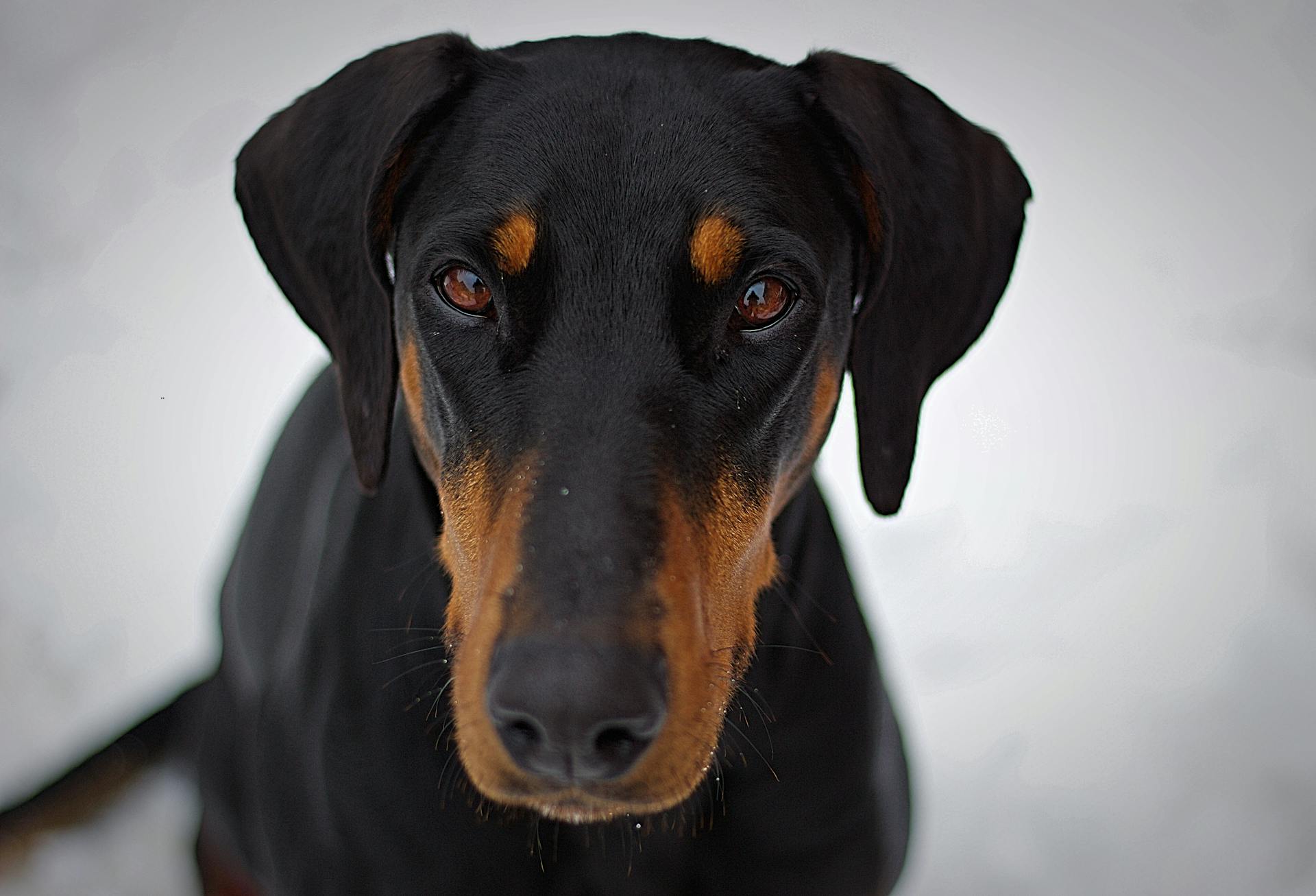
Von Hohenhalla Dobermans is a family-oriented kennel dedicated to producing superior European Dobermans. They prioritize breeding healthy puppies with fantastic temperaments, strong working drive, and excellent conformation.
Their goal is to produce dogs that serve as travel companions, protectors, playmates, and even service dogs. This breeder is committed to upholding the Doberman Pinscher breed standard.
Von Hohenhalla does not produce or recognize "warlock" or oversized dogs. Nor does it produce or admit colors like dilute (including fawn/Isabella & rust or blue/gray & rust).
Here are some key characteristics of Von Hohenhalla's breeding program:
You can check the exact prices online on their puppy page or contact them directly via phone or email.
Featured Images: pexels.com

